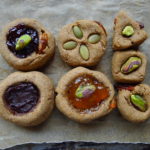
Roasted Garabanzo Cookies with Saffron
Roasted Garabanzo Cookies are descended, in my brain, from the dry roasted split chickpea (pottu kadalai..பொட்டுக்கடலை) I used to eat when I was a protein starved vegetarian monk in Tamil Nadu, South India, as a youth.
Roasted Garabanzo are a favorite snack in South Asia from Afghanistan to Burma is dry roasted Chickpea, known in India by many names from gram, to black gram, to bengal gram, to channa, to dhaliya, to pottu kadalai and many more.
This is the same bean known as Hummus in Arabic (whether whole or mashed into paste with tahina), Garabanzo in Spanish, and Ceci in Italian. In USA they seem to be known by both the Spanish Garabanzo, and the English, Chick Pea, I imagine b/c they are a bit the color of a young chick..
Street Vendors in Chennai
When I lived in Tamil Nadu, especially in Chennai, it was fun to hear the roasted garabanzo vendors banging their giant pans with the edge of their metal spoons to create an attention grabbing bell-like sound while yelling, “Kadalai! Kadalai! Kadalai!”
Kadalai, or dry roasted whole chick peas (garabanzo), are eaten as a snack food the way roasted peanuts are in the USA. (Whereas in Asia peanuts are most often taken boiled, in India, with turmeric and salt).
They are combined with salt and chilli powder, added to numerous kinds of delicious, but very high fat fried snack foods made from chick pea and rice flour, and even eaten plain, in a pinch, or mixed with some fresh coconut and raw sugar.
The version sold on the street in India are whole dry roasted chickpea, which you will in any South Asian or Middle Eastern market. The kind I prefer, dry roasted split chickpea is only going to be found in the Indian market, or online.
Tamil Vegetarian Cooking
Split dry roasted garabanzo is a mainstay in Tamil vegetarian cooking, amping up the protein quotient in cooked vegetable dishes and also chutneys and pachadis, which are raw vegetable or even fruit side dishes. I prefer the split version even for snacking because I think the texture is ever so slightly softer, and because then you don’t have pieces of hull.
While Chickpeas in various forms are used in Indian sweets, like the famous Laddu of the South Indian Hindu temple, what made me think of trying roasted garabanzo in my breakfast cookies was the tiny melt-in-your-mouth Chickpea flour cookies I have encountered in the Iranian/Persian market.
Persians are great lovers of saffron and cardamon, not to mention rose, and make an array of delightful, subtle, little cookies with rice, wheat, or chickpea flour, saffron, cardamon, and rose water.
But the chickpea flour cookies they make are especially delicious and just melt in your mouth; because chickpea flour has this ineffable soft quality to it that is related to why in Chinese medicine and Ayurveda Chickpeas are seen as very easy to digest.
Its also why chickpea flour, besan in Hindi, kadalai maavu in Tamil, is so well represented in Indian cuisine, from the besan dhokla of Gujarat, to pancakes, to the flour veggies are dipped in to make pakora and bhajji.
Garabanzo in Chinese Medicine and South East Asian Food Culture
In Chinese Medicine garabanzo are said to “nourish the Spleen Qi.” The Spleen Qi is code in Chinese Medicine for how the body extracts and distributes energy from food, what Ayurveda describes in terms of Agni/Digestive fire. When a food is said to “nourish the Spleen Qi” that is code for “easy to digest.”
Indeed, another famous Asian bean, favored in Japanese culture in deserts, is the Azuki bean, sometimes written Aduki. In classical Japanese nutrition Azuki are called “honorary grain” a reference to both their frequency in Japanese culture, but also to their ease of digestion.
Azuki and Chickpea are both quite light, compared to beans like Kidney and Black bean. That is not woo woo. With any sensitivity you can feel that in your stomach and body when you eat them, they actually feel light, the way an apple feels light compared to a steak.
I use roasted chickpeas in my breakfast cookies as an alternative to wheat flour, because I like the texture they bring with them, and because they are chock full of gluten-free nutrients,
Roasted Garabanzo Cookie Nutrients
Chickpeas have a Protein Digestibility Corrected Amino Acid Score of about 0.76, which is higher than many other legumes and cereals. Evidently science confirms what Chinese medicine described through empiricism.
Proteins in cooked and germinated chickpeas are rich in essential amino acids, and 75% of the lipid content in the fat that makes up 3% of a chickpea, is unsaturated fatty acid for which linoleic acid makes up 43%.
Garabanzo are loaded with other nutrients, including easily digested fiber, folate, iron, and phosphorus. Roasted Garabanzo cookies also contain moderate amounts of Thiamin, Vitamin B-6, magnesium, and zinc contents from the chickpeas.
There are a million ways to make these high protein, high fiber, good fat, nutrient dense, gluten free, low sugar, vegan breakfast cookies. How will you make yours?
Roasted Garabanzo Cookies
Dry Ingredients
2 tbsp Roasted Split Chickpeas/Garabanzo
2 tbsp Pumpkin Seed
2 tbsp Raw Almond Flour (or blanched)
2 tbsp Date Pieces (fresh date is too wet and won’t mix)
1 tbsp Goji Berry
1 tsp Cardamon seed or powder
½ to 1 tsp Saffron threads
½ tsp coconut sugar
1 pinch salt (less that ⅛ tsp)
Wet Ingredients
2 tbsp Walnut Oil (may substitute with Olive Oil)
4 tbsp Milk of any kind, see below
Dash of Rose water
Raspberry or other fruit jam, 1/4 tsp per cookie.
Or chopped fresh fruit, to decorate cookies
I use cow or goats milk, but any nut or soy or coconut milk will do. Think about the flavor you want. Coconut milk goes very well with cardamon and saffron. Read the ingredient of those boxed nut milks. Most of them have very little actual nut and much more water and guar gum. They also often have preservatives.
Directions
Place the roasted chick pea, pumpkin seed, and saffron in your spice grinder or food processor. A spice grinder/coffee grinder I think works better, because you want the roasted chick pea nearly powdered. If you have one of those big old Indian grinders you can do all the dry ingredients at once, but in a normal sized coffee grinder you have to split in half or things will not get fine enough, and you may burn out your motor, too. Grind till fairly fine. Now do the same with the almond, date, cardamon, sugar and salt. Whisk together in a bowl.
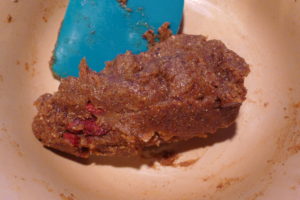
Roasted Chickpea Nut Cookie Batter
Add the oil and mash with spatula until the oil is well distributed among the dry ingredients. Now add the milk and mash again. What you want now is a very slightly oily dough that pulls away from the bowl without sticking to the sides too much. If you want the dough to pull away absolutely cleanly from the bowl, then you need more oil, which is fine, but for oldsters like me who don’t need unnecessary fat, I keep the oil content lower. Those chewy cookies you get in the store that leave your fingers slightly greasy have a very high fat ration. But I like the Italian model for cookies that are bit crunchy, and a bit drier. My friend Marsh loves my cookies, but describes them, with humor, as “hard tack.” That’s a bit over the top, but is the idea. For dipping or dunking cookies must be a bit stronger. Like mandelbroit or the Siennese Cantucci.
Wet or oil your hands. Use a spoon to break off a small chunk of dough, roll between your palms to form something a little less than a golf ball. Flatten slightly in your palm. Place it on the cookie sheet. Or forget about all that work, and just grab some dough with a spoon and place it on cookie sheet. I like how they come out this way too, a bit rough around the edges seems to give a slightly different texture, maybe the heat penetrates differently this way.
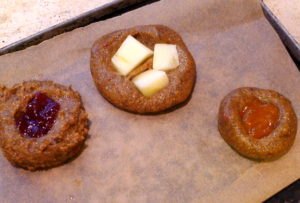
Healthy Breakfast Cookie Before Baking
Press the center with your thumb to make a small depression. Using a 1/4 tsp measure, place jam in the center, and press the jam down gently with the back of the measuring spoon.
Alternatively, press small pieces of fruit, like apple or banana or berries in season, into the cookies.
Or, decorate the cookies with nuts. Walnuts and pumpkin seeds look very nice and are delicious.
Bake for 15 to 20 minutes at 400 in the toaster oven. Times and temp will vary depending on your machine or oven. I also like my a bit more brown than raw, although this batter is so good you can eat it uncooked even, like a sweetmeat.
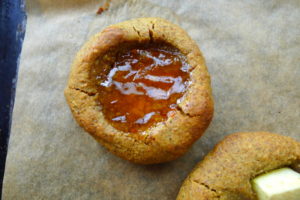
Copyright Eyton J. Shalom, San Diego Ca, January 2017 All rights reserved Use with permission.
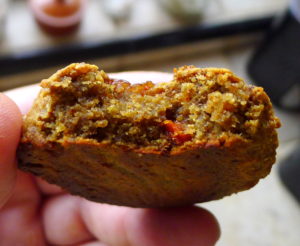
Roasted Chickpea Nut Cookie www.bodymindwellnesscenter.com


There is something about be-jammed thumbprint cookies that I cannot resist, however those I find in stores are LOADED with sugar and grease. Aha! Snacking independence! I love how Eyton practically begs you to customize the recipe according to your diet politics and this recipe has plenty of flexibility and creative options to explore. AND you can make a quick breakfast batch in 10 minutes in a toaster oven. Shukran!
Eyton, These look gorgeous and delicious. Thank you for your commitment to health and your stories of life in Chennai. All of it so rich.
Hi Laura! I stumbled upon this site a few days ago and made an appt for an Ayurvedic consult, and I happened to just see your comment! Your picture caught my eye because I just finished one of your lectures. I am a current student in UCSD’s Integrative Nutrition program. Small world! I’m very excited for my consult next week to learn more about my dosha! Thank you for your lecture!